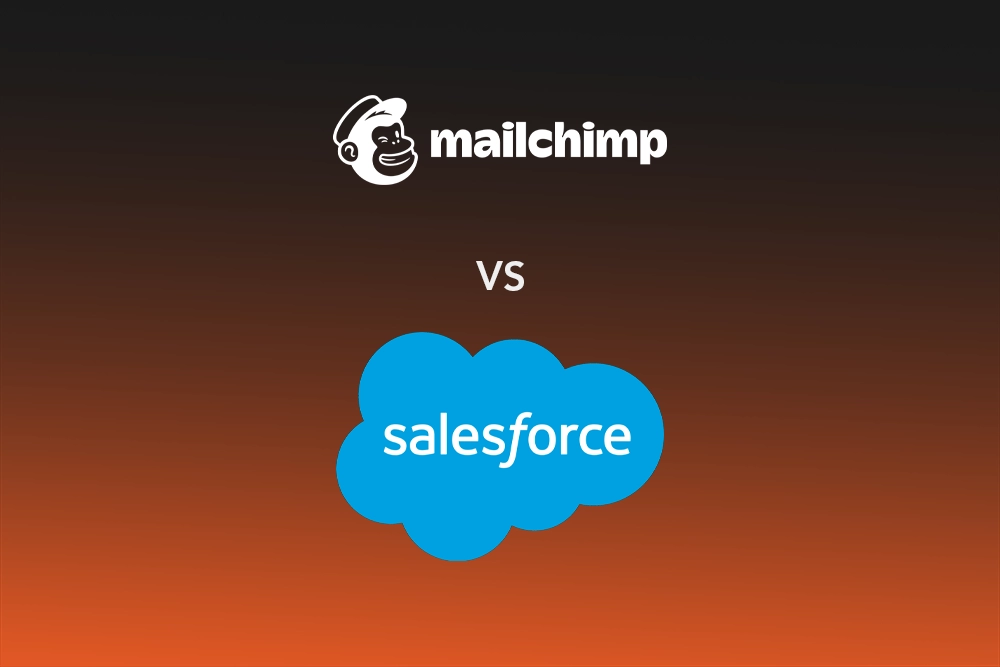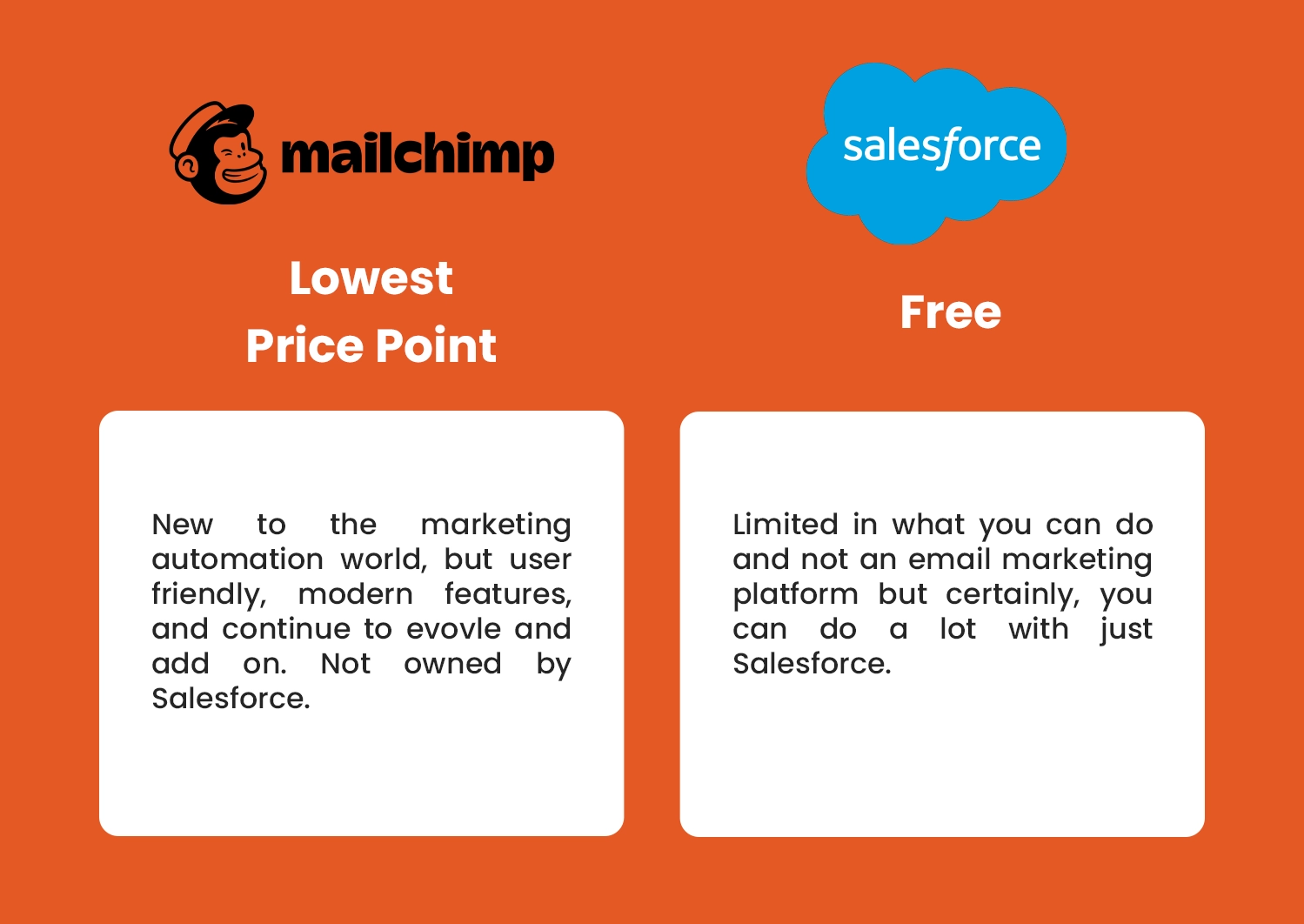
In today's marketplace, companies encounter numerous issues. For example, they struggle with managing relationships, automating marketing processes, and customer interaction. Moreover, many companies currently utilize inadequately integrated systems. Consequently, unproductive processes, less output, and resources left over are probable.
Choosing a platform for CRM, sales, automation, and marketing is always complex. The vast array of options presents a challenging task. Especially, when comparing Salesforce and Mailchimp, two leading providers of these services. However, they cater to different types of businesses. So, which one serves your purpose best?
To clarify this, our guide will help you explore the differences between Salesforce vs Mailchimp. More specifically, it will cover aspects such as features, pricing, ease of use integration, and customer services. Finally, you will learn which type of businesses each caters to.
Let's explore!

Before investing in anything, it is important to understand what each platform provides. Therefore, in this aspect, we will look in detail at Mailchimp and Salesforce. First, we will explore what they do fundamentally. Additionally, we will see how they accommodate companies depending on various scales.
Mailchimp ranks among the most ruling online email marketing services. It enables users to set up, automate, and analyze emails for any business use with relative ease. At the same time, its user-friendly platform is practical for small and medium scale enterprises.
Over time, Mailchimp has expanded its services. As a result, it offers audience segmentation. In addition, it includes landing page creation, social media marketing, and e-commerce marketing.
Salesforce is a provider of cloud technology services for CRM systems. It helps manage, automate, and analyze marketing and sales activities in any business.
Furthermore, Salesforce is a good option for businesses with advanced requirements. This is due to powerful automation, customer journey mapping, and AI insight capabilities. These are simplified solutions available in the business with a Marketing Cloud and Pardot.
The most important attributes of any marketing automation include features. In fact, they are the cornerstone of the specific tool. Therefore, below is a comprehensive comparison of Salesforce vs Mailchimp. It specifically covers email marketing, automation, CRM, and integrations.
Salesforce and Mailchimp offer profound features for their customers. In particular, email marketing remains effective. In fact, it is one of the best engagement channels. However, there are differences in the ways each of these companies approaches it.
Salesforce (for advanced personalization and multi-channel capabilities). On the other hand, Mailchimp is simpler and easier to execute the campaigns.
Automation of marketing activities saves time and resources. This is especially, true during lead nurturing and conversion. While both platforms offer automation, the level of customization is quite distinct.
Mailchimp is ideal for basic needs and small-scale automation. Meanwhile, Salesforce is more suitable for advanced automation systems.
To the extent that businesses can track client engagement and information. As a result, they can use CRM functionality to track interaction data.
Salesforce is the comprehensive winner as a complete CRM software. In contrast, Mailchimp is only restricted to rudimentary contact management.
The application of extensions helps businesses seamlessly integrate platforms. As a result, this enhances the functionality of the platform while other software improves its capability.
Salesforce has a lead due to the numerous third-party integrations and the native CRM link.
Data insights are important in analyzing and measuring the marketing strategy’s success. Therefore, now, let us examine the differences between the two platforms.
Salesforce wins because it effectively uses AI-powered insights. Additionally, it offers advanced analytics which are superior to standard platforms.
In this portion, we will take a deeper look at the advantages and disadvantages of Salesforce vs Mailchimp. As a result, it will help you better choose the software that will benefit your business the most.

Mailchimp and Salesforce Marketing Cloud offer differing plans. In addition, they are priced according to features and services. Therefore, understanding the scope of pricing offers will help in budget planning.
Mailchimp is much more affordable for small businesses. Meanwhile, Salesforce is best suited for enterprises with larger budgets.
In the end, both Mailchimp and Salesforce stand out. However, it depends on the businesses.
Furthermore, if you are upscaling business then use both platforms together. As a result, they can provide the best outcomes.
For illustrative purposes only, it would have to be MailChimp. But then again, what about Salesforce? What truly makes it stand apart? And most importantly, which one really offers marketing automation and CRM integration?
Furthermore, Let's talk about business intelligence analytics. In addition to making an informed decision, you have to make a side by side comparison. It includes features, price, and all sorts of capabilities. This way, you can purchase the best tool for your business. So, make a decision and step your marketing methods outside the box.
Still need expert guidance? Then, contact PixelConsulting for personalized advice and seamless implementation. Get in touch now at PixelConsulting. Now is the perfect time to take your marketing to new heights!
Absolutely, though it works as a CRM, on the other hand, Salesforce's functionality is unmatched.
Of course, Mailchimp’s integration within Salesforce is a game changer. In fact, it allows users to consolidate all marketing and CRM tasks under one umbrella.
Totally Salesforce is the way to go. It’s the best because of the automation it has and more importantly the level of AI integrations as compared to everyone else.
Of course, using the Marketing Cloud and Pardot is highly effective. Not only do they help automate and segment email marketing. But they also enhance engagement and improve efficiency.
Of course, it sells digital products via funnel pages and automation sequences.
Yes, that's true, but not with the sophisticated database management capabilities of a full-fledged CRM.
No, instead, it allows campaign landing pages, advertisement pages, and automation features.
Mailchimp works best with small-scale e-commerce stores, as it is cheaper and easy to use. On the other hand, Salesforce provides high-level automation for bigger organizations.
Automation is nonexistent and it gets pricier the more you use it. On top of that, it offers far less CRM capability compared to Salesforce.
Read Also : Appian vs Salesforce